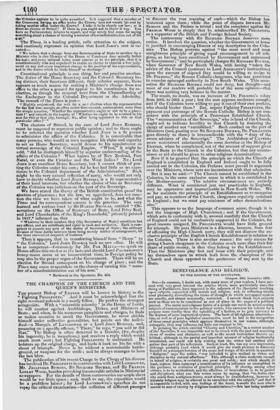THE CHAMPION OF THE CHURCH AND THE QUEEN'S MINISTERS.
THE present Bishop of' EXETER will be known in history as the " Fighting PUILLPOTTS." And it must be acknowledged that the right reverend polemic is a manly fellow. He prefers the strongest antagonists. With a "miserable minority" in the House of Lords, he will combat against Archbishops, Dukes, and Ministers of State ; and when, in his numerous pamphlets and charges, he finds or makes occasion to assail the Government, he never shields himself under collective generalities, but points out the indivi- dual—a Marquis of LANSDOWNE or a Lord JouN Ressimm., and, pouncing on a specific offence, "There," he says," you said or did that." The Bishop is often detected in a blunder, Ow despite his ingenuity, lie is incautious,) and receives a reply which would crush most men ; but Fighting PUILLPOTTS is undaunted. He bolsters up the original charge, and hurls it back on his foe with a shout of triumph. Never is he without a maintainable battle- ground, or weapons for the strife ; and he always manages to have the last blow.
The publication of his recent Charge to the Clergy of' his diocese has involved Dr:PIIILLPOTTS in controversies with Lord LANSDOWNE, Mr. JELLINGER SYMONS, Sir RICUARD ROURKE, and Sir FRANCIS Lamer W000, besides provoking innumerable articles in-Ministerial newspapers. For the details of these controversies our ample sheet would be too little space; and, truth to say, the eosition would.
be a profitless lab xP
our ;. for Lord LANSDOWNE'S Speeches do not repay the critical 'eXamination—the eollatiou Of clifferent passages to: discover the true meaning of .each—which the Bishop -has' bestowed upon them ; while the -point of dispute between Mrs SYMONS and the Prelate is trivial s and the complaint against Sir- FRANCIS WOOD is, Silnply 'that he misdeseribed 1'111C/seem as a supporter of the British and Foreign School Society. The controversy with Sir RiCIIARD BOURKE deserves more notice.. It involves the question, whether the Government at home is justified in encouraging Dissent of any description-in the Colo- - flies. The Bishop protests against "the most novel and most unrighteous principle of giving equal encouragement to all reli- gions, as having been sanctioned by Government and announced by Government ; " and he particularly charges Sir RICHARD BOURKE, when Governor of New South Wales, with having "taken the advice of the Council (contrary to Lord ABERDEEN'S instructions) upon the amount of stipend they would be .willing to assign to Dr. FOLDING," the Roman Catholic clergyman, who was permitted to exercise episcopal authority in New South Wales. This accu- sation Sir RICIIARD BOURKE could not deny, but thought—and most of our readers will probably be of the same opinion—that there was nothing very heinous in the matter. The result, no doubt, was an increase of Dr. POLDING'S salary from '2001. to 500/. a year ; but the sum appears moderate enough ; and if the Colonists were willing to pay it out of their own pockets, who should hinder them ? But, argues Fighting PIIILLPOTTS, the payment and patronage of the Roman Catholic Bishop is not con- sistent with the principle of a Protestant Established Church. The "representatives of the Sovereign," who is head of the Church, ought not to indicate hostility to that Church by fostering the clergy of another not "established." Such conduct on the part of Ministers (and, passing over Sir RICHARD BOURKE, Dr. PIIILLPOTTS goes directly to them) is irreconcileable with the "duty of' the sworn advisers of the Sovereign." The Archbishop of CANTER- BURY maintained substantially the same doctrine as the Bishop of Emma, when he complained, not of the amount of support given by the State to the Church in the Colonies, but that any counte- nance or aid should be given to other religious denominations.
Now if it be granted that the principle on which time Church of England is established in England and Ireland ought to be fully carried out in the Colonies, the Prelates must prevail in argument over the Ministers, whose acts are inconsistent with that admission.
But it may be said—" The Church cannot be established in the Colonies, in the same exclusive sense in which it is established in the Mother-country. The relative circumstances are entirely different. What is considered just and practicable in England, may be oppressive and impracticable in New South Wales. We so fir maintain the principle of an Establishment as to recognize and pay, as members of the Church, clergymen regularly ordained in England ; but we must pay ministers of other denontinations also."
This appears to us the language of common sense, though, it is not the language of High Churchmen ; and if the Government, which acts in conformity with it, avowed manfully that the Church of England could not be exclusively supported in the Colonies, for good reasons assigned, Dr. PHILLPOTTS would have little ground for triumph. He puts Ministers in a dilemma, because, from fear
of offending the High Church party, they will not disavow the ex- clusive principle of the English Church Establishment in relation to the Colonies. There is also another reason : the only excuse for giving Church clergymen in the Colonies much snore than their fair share of public money, is that they belong to the Establishment. Thus the Ministers play fast and loose with their principle, and lay themselves open to attack both from thc champions of the Church and those opposed to the preference of any sect by the State.


























 Previous page
Previous page